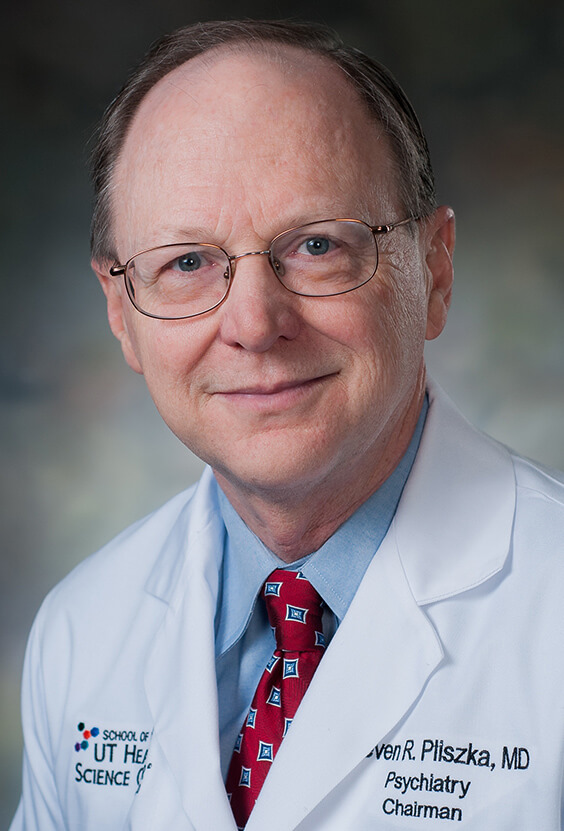
In a recent study published in the Journal of American Medical Association, pediatric visits nationwide to the emergency room for mental health reasons have doubled. Of those visits, the proportion of visits for suicide-related symptoms increased five-fold.
Steven Pliszka, MD, chairman of the Department of Psychiatry and Behavioral Sciences at The University of Texas Health Science Center at San Antonio, said Bexar County follows the national trend of emergency room visits for mental health issues and increasing mental health referrals for adolescents and young adults.

“Nationally, we’re seeing a big uptick in referrals, a big uptick in ER visits and psychiatric hospitalizations over the last year or so,” he said. “What’s happening locally clearly parallels what’s going on nationally.”
However, Pliszka said, the increased demand for mental health services for children and young adults has outpaced the number of available mental health professionals.
According to a 2022 report by the Texas Health and Human Services, 170 counties in Texas had no licensed psychiatrists; half were rural counties. Harris, Dallas, Travis, Bexar, Tarrant and Collin counties account for two-thirds of Texas licensed psychiatrists. The statistics worsen for child psychiatrists. In the state, there are 745 practicing child and adolescent psychiatrists. The study reported that Kendall County is the only county in Texas with a mostly sufficient supply of child psychiatrists to meet demand.
Pliszka said the shortage has led to waiting times as high as four months. Exacerbating the challenge of finding help is that many therapists and psychiatrists don’t accept health insurance, leaving many parents with few options.
Formalizing solutions to meet an urgent need
To alleviate the demand and increase the supply for child therapists and psychiatrists, UT Health San Antonio is part of a state-funded program providing free access to mental health providers. The same program is working to increase the number of mental health professionals to help parents struggling to find affordable services.
The Texas Child Mental Health Care Consortium (TCMHCC) is a statewide initiative created by the 86th Texas Legislature in 2019. It is comprised of twelve regions across the state. According to Kristina Martinez Fields, MS, LMFT, a faculty specialist and program manager for the consortium at UT Health SA, within each region, health-related institutions are working together to address the urgent mental health needs of Texas youth. The TCMHCC has five focus areas, including programs designed to provide direct services to children and work-force initiatives, designed to increase the number of child therapists and child psychiatrists.
One of the focus areas of the consortium is the Texas Child Health Access Through Telemedicine (TCHATT), a program that partners with local school districts in Bexar County and 35 surrounding counties. Through TCHATT, students are eligible for free therapy services, medication treatment and case management. Students are referred by their school counselor.
“We serve all ages through our partnering school districts, K-12th grade, although the majority of our referrals are middle and high school,” said Fields.
Students can use telehealth technology to meet with a licensed provider using a cell phone or laptop. If the student prefers, the appointments can be conducted at school. The therapy sessions are free and require parental permission.
“The goal for TCHATT is for these kids to be seen quickly, identify their needs and provide them with the appropriate therapies and supports. It’s about rapid access,” said Fields, although she cautions that TCHATT is not an emergency service.
The program is beneficial in rural communities as well, where mental health providers are few and far. Currently, within the UT Health San Antonio region, 73 school districts are part of the TCHATT network, serving 627 campuses, many of which are in rural communities. Since its commencement in 2020, TCHATT now provides 400,000 students with access to mental and behavioral healthcare services.
Fields said children can have up to 10 free visits; if additional help is needed, they will be referred to an outside provider for long-term care. Children who have completed their allotted sessions can return to the program if they need further help later, Fields said.
“Let’s say they leave us for a little while and want to come back because something changed or shifted; they can do that, too,” she said.
Help for family members, too
Fields said the program is not just for children. Parents and other family members can receive free supportive counseling sessions.
If children and their parents prefer to see a therapist in person, the Wellness for Children and Adolescents Restorative Empowerment Clinic, WE CARE clinic, is available on the UT Health San Antonio campus. The clinic, located on the 7th floor of the Joe R. and Teresa Lozano Long School of Medicine, provides free mental health therapy for children and young adults who are 3 to 20 years old.
Family therapy is also available, as well as virtual appointments. Specialists within the TCHATT clinic can also treat patients for substance use, trauma and school refusal.
“We saw a lot of school avoidance post-pandemic, with students not wanting to go back to school, a lot of avoidance and social anxiety,” Fields said.
Causes of increased stress
Pliszka said he believes a contributing factor in the rise in mental health referrals is a general stress level in society among teens and young adults about an unpredictable future. He said teens worry about family finances and family structures.
“It’s kids feeling like, ‘What am I going to do with my life? I’m not going anywhere. I’m stuck,’” he said.
Pliszka said social media also plays two key roles in negatively impacting teens.
“One way is through what we call contagion. Kids are going to internet sites where depression and suicide are talked about a great deal but not in a therapeutic way,” he said.
The second way is teens and young adults see the illusion of a life better than their own on social media and become depressed about their circumstances.
“Therapists struggle with treating it because this type of depression doesn’t respond to medication or traditional therapy,” he said. “Teens have to put out the effort to socialize, have real friends and get out of their room.”
He said the return to pre-pandemic routines also impacted teens.
“I think one of the unfortunate things about the pandemic is so many kids got very comfortable at home all day. School was a couple of hours a day, and you didn’t even have to go if you didn’t really feel like it,” Pliszka said.
Pediatrician assistance
In addition to providing free services to children and their families, members of the consortium are providing free consultations for pediatricians through the Child Psychiatry Access Network.
“It’s like a ‘phone-a-friend’ service. They [pediatricians] can call us anytime between 8 a.m. and 5 p.m., Monday through Friday, and consult with one of our child psychiatrists,” Fields said. “Pediatricians can ask to speak with our child psychiatrist at the time of their call or schedule a more convenient time to be called back. Currently, we average under five minutes to speak to a psychiatrist, but our promise is to have you connected to a child psychiatrist in under 30 minutes.”
Fields said pediatricians are often the front line for all mental health since they are the first doctors a parent will take their child to for help.
“We know that sometimes the pediatrician doesn’t feel confident to provide those services. They essentially have a psychiatrist in their back pocket, and having this resource has been incredibly helpful to them,” she said.
Fields said through the network, pediatricians can refer parents to vetted therapists and psychiatrists based on where they live and the patient’s health insurance.
Additionally, Fields said pediatricians can participate in monthly continuing education sessions through the network.
“We’re really looking to empower and equip them with knowledge. If our pediatricians feel confident managing these low to moderate mental health concerns, that takes the burden off the already backed-up system and may help alleviate the lengthy wait list for mental health services in our community,” she said.
Bolstering the psychiatrist pipeline
Pliszka said each year, the Department of Psychiatry recruits about 10 percent of students graduating from medical school to enter the field of psychiatry.
“That’s about 20 people. That’s really good,” he said. “But they have to do a four-year residency, so it’s going to be a while before that pipeline gets going.”
The consortium is working to increase the number of providers through two workforce programs. One is the Community Psychiatry Workforce Expansion, which funds academic psychiatrists and psychiatrist residents to work at facilities operated by community mental health providers.
The second is the Child and Adolescent Psychiatric Fellowships program, which expands the number of child and psychiatry fellowship positions in Texas and the number of training programs at Texas Health-Related Institutions.
Health checks for the helpers
Fields said mental health work is challenging and not for everyone. Every day they are confronted with serious mental health concerns, family conflict and complex traumas, and because of that, the burnout rate is high, she said.
“At UT Health San Antonio, we really try to encourage self-care and work-life balance. We equip our team with Laura Van Dernoot Lipsky’s book Trauma Stewardship. We meet once a month in person for an in-service meeting. We have work-related discussions but also try to make it fun, celebrate birthdays and program milestones,” Fields said.
She said supervisors work to manage the patient workload among therapists so no one therapist is overloaded with one type of case. A departmental psychologist has been hired to help the faculty and department focus on wellness.
“It’s a lot, you know. A lot is happening in these kids’ lives and it’s a lot to take in. We’re doing our best to support our team and encourage them to practice self-care,” she said. “We need to remember to put our oxygen masks on first, so we can show up ready to help others.”

